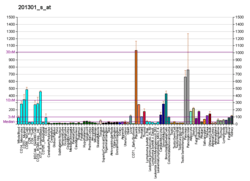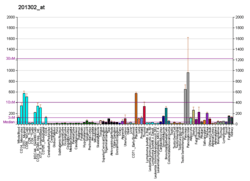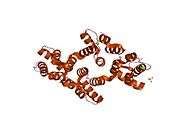Annexin A4
Annexin A4 is a protein that in humans is encoded by the ANXA4 gene.[3][4]
Function
Annexin IV (ANX4) belongs to the annexin family of calcium-dependent phospholipid binding proteins. Although their functions are still not clearly defined, several members of the annexin family have been implicated in membrane-related events along exocytotic and endocytotic pathways. ANX4 has 45 to 59% identity with other members of its family and shares a similar size and exon-intron organization. Isolated from human placenta, ANX4 encodes a protein that has possible interactions with ATP, and has in vitro anticoagulant activity and also inhibits phospholipase A2 activity. ANX4 is almost exclusively expressed in epithelial cells.[4]
References
- ↑ "Human PubMed Reference:".
- ↑ "Mouse PubMed Reference:".
- ↑ Tait JF, Smith C, Frankenberry DA, Miao CH, Adler DA, Disteche CM (Feb 1992). "Chromosomal mapping of the human annexin IV (ANX4) gene". Genomics. 12 (2): 313–8. PMID 1346776. doi:10.1016/0888-7543(92)90379-7.
- 1 2 "Entrez Gene: ANXA4 annexin A4".
External links
- Human ANXA4 genome location and ANXA4 gene details page in the UCSC Genome Browser.
Further reading
- Römisch J, Heimburger N (May 1990). "Purification and characterization of six annexins from human placenta". Biological Chemistry Hoppe-Seyler. 371 (5): 383–8. PMID 2143074. doi:10.1515/bchm3.1990.371.1.383.
- Römisch J, Grote M, Weithmann KU, Heimburger N, Amann E (Nov 1990). "Annexin proteins PP4 and PP4-X. Comparative characterization of biological activities of placental and recombinant proteins". The Biochemical Journal. 272 (1): 223–9. PMC 1149680
 . PMID 2148260.
. PMID 2148260. - Freemont PS, Driessen HP, Verbi W, Crumpton MJ (Nov 1990). "Crystallization and preliminary X-ray crystallographic studies of human placental annexin IV". Journal of Molecular Biology. 216 (2): 219–21. PMID 2254922. doi:10.1016/S0022-2836(05)80310-9.
- Hauptmann R, Maurer-Fogy I, Krystek E, Bodo G, Andree H, Reutelingsperger CP (Oct 1989). "Vascular anticoagulant beta: a novel human Ca2+/phospholipid binding protein that inhibits coagulation and phospholipase A2 activity. Its molecular cloning, expression and comparison with VAC-alpha". European Journal of Biochemistry / FEBS. 185 (1): 63–71. PMID 2530088. doi:10.1111/j.1432-1033.1989.tb15082.x.
- Grundmann U, Amann E, Abel KJ, Küpper HA (Apr 1988). "Isolation and expression of cDNA coding for a new member of the phospholipase A2 inhibitor family". Behring Institute Mitteilungen (82): 59–67. PMID 2970257.
- Ahn NG, Teller DC, Bienkowski MJ, McMullen BA, Lipkin EW, de Haën C (Dec 1988). "Sedimentation equilibrium analysis of five lipocortin-related phospholipase A2 inhibitors from human placenta. Evidence against a mechanistically relevant association between enzyme and inhibitor". The Journal of Biological Chemistry. 263 (35): 18657–63. PMID 2974032.
- Tait JF, Sakata M, McMullen BA, Miao CH, Funakoshi T, Hendrickson LE, Fujikawa K (Aug 1988). "Placental anticoagulant proteins: isolation and comparative characterization four members of the lipocortin family". Biochemistry. 27 (17): 6268–76. PMID 2975506. doi:10.1021/bi00417a011.
- Sjölin C, Stendahl O, Dahlgren C (Jun 1994). "Calcium-induced translocation of annexins to subcellular organelles of human neutrophils". The Biochemical Journal. 300 ( Pt 2) (Pt 2): 325–30. PMC 1138165
 . PMID 8002935.
. PMID 8002935. - Kojima K, Yamamoto K, Irimura T, Osawa T, Ogawa H, Matsumoto I (Mar 1996). "Characterization of carbohydrate-binding protein p33/41: relation with annexin IV, molecular basis of the doublet forms (p33 and p41), and modulation of the carbohydrate binding activity by phospholipids". The Journal of Biological Chemistry. 271 (13): 7679–85. PMID 8631806. doi:10.1074/jbc.271.13.7679.
- Davis AJ, Butt JT, Walker JH, Moss SE, Gawler DJ (Oct 1996). "The Ca2+-dependent lipid binding domain of P120GAP mediates protein-protein interactions with Ca2+-dependent membrane-binding proteins. Evidence for a direct interaction between annexin VI and P120GAP". The Journal of Biological Chemistry. 271 (40): 24333–6. PMID 8798684. doi:10.1074/jbc.271.40.24333.
- Satoh A, Takayama E, Kojima K, Ogawa H, Yamori T, Sato S, Kawaguchi T, Tsuruo T, Katsura Y, Kina T, Matsumoto I (Feb 1996). "Expression of carbohydrate-binding protein p33/41 in human tumor cell lines". Journal of Biochemistry. 119 (2): 346–53. PMID 8882729. doi:10.1093/oxfordjournals.jbchem.a021246.
- Satoh A, Takayama E, Kojima K, Ogawa H, Katsura Y, Kina T, Matsumoto I (Mar 1997). "Characterization of human p33/41 (annexin IV), a Ca2+ dependent carbohydrate-binding protein with monoclonal anti-annexin IV antibodies, AS11 and AS17". Biological & Pharmaceutical Bulletin. 20 (3): 224–9. PMID 9084877. doi:10.1248/bpb.20.224.
- Dreier R, Schmid KW, Gerke V, Riehemann K (Aug 1998). "Differential expression of annexins I, II and IV in human tissues: an immunohistochemical study". Histochemistry and Cell Biology. 110 (2): 137–48. PMID 9720986. doi:10.1007/s004180050275.
- Chow A, Davis AJ, Gawler DJ (Mar 2000). "Identification of a novel protein complex containing annexin VI, Fyn, Pyk2, and the p120(GAP) C2 domain". FEBS Letters. 469 (1): 88–92. PMID 10708762. doi:10.1016/S0014-5793(00)01252-7.
- Han EK, Tahir SK, Cherian SP, Collins N, Ng SC (Jul 2000). "Modulation of paclitaxel resistance by annexin IV in human cancer cell lines". British Journal of Cancer. 83 (1): 83–8. PMC 2374538
 . PMID 10883672. doi:10.1054/bjoc.2000.1311.
. PMID 10883672. doi:10.1054/bjoc.2000.1311. - Radau B, Otto A, Müller EC, Westermann P (Jul 2000). "Protein kinase C alpha-dependent phosphorylation of Golgi proteins". Electrophoresis. 21 (13): 2684–7. PMID 10949146. doi:10.1002/1522-2683(20000701)21:13<2684::AID-ELPS2684>3.0.CO;2-G.
- Gerner C, Frohwein U, Gotzmann J, Bayer E, Gelbmann D, Bursch W, Schulte-Hermann R (Dec 2000). "The Fas-induced apoptosis analyzed by high throughput proteome analysis". The Journal of Biological Chemistry. 275 (50): 39018–26. PMID 10978337. doi:10.1074/jbc.M006495200.
- Tsujii-Hayashi Y, Kitahara M, Yamagaki T, Kojima-Aikawa K, Matsumoto I (Dec 2002). "A potential endogenous ligand of annexin IV in the exocrine pancreas. Carbohydrate structure of GP-2, a glycosylphosphatidylinositol-anchored glycoprotein of zymogen granule membranes". The Journal of Biological Chemistry. 277 (49): 47493–9. PMID 12324456. doi:10.1074/jbc.M206572200.
This article is issued from
Wikipedia.
The text is licensed under Creative Commons - Attribution - Sharealike.
Additional terms may apply for the media files.





